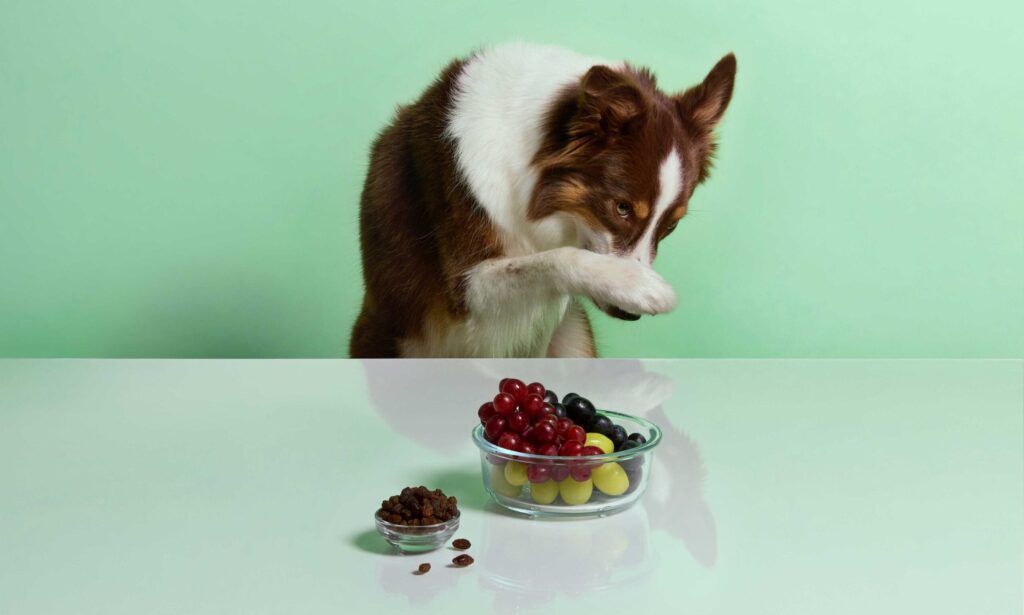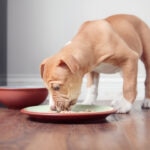What Can Dogs Not Eat? 14 Toxic Foods for Dogs

Photo by Chewy
While some human foods are perfectly safe as the occasional treat, others can cause serious—and sometimes life-threatening—problems for dogs. So, how do you know the difference? What can dogs not eat? Here are 14 toxic foods for dogs, as well as symptoms to watch out for.
If your dog eats any toxic foods, call your veterinarian for guidance or take them to the nearest veterinary or pet emergency clinic. You can also call the Pet Poison Helpline at 855-764-7661.
Key Takeaways
- Some common human foods, such as chocolate, grapes, and xylitol, are highly toxic to dogs.
- Symptoms of toxicity vary but may include vomiting, seizures, and in severe cases, organ failure.
- When in doubt, always contact your vet or the Pet Poison Helpline immediately.
- Avoid feeding your dog foods that are high in fat, salt, or sugar, even if not overtly toxic.
14 Toxic Foods for Dogs
What foods can dogs not eat? Here’s a breakdown of the most common ones that can harm your pup (some simply dangerous, others truly poisonous)—and what to do if they get into them.
- Alcohol
- Avocados
- Baked goods
- Chocolate, coffee, and caffeine
- Corn on the cob
- Dairy products
- Grapes and raisins
- Nuts
- Onions, garlic, chives, and leeks
- Raw meat and eggs
- Salty foods
- Stone fruits
- Xylitol
- Yeast dough and raw bread dough
1. Alcohol
Dogs metabolize alcohol much more slowly than humans, making even small amounts dangerous. It depresses the nervous system and can quickly overwhelm your dog’s body, potentially leading to life-threatening complications.
Symptoms of alcohol poisoning in dogs include:
2. Avocados
The skin, leaves, and seeds of avocados contain high levels of persin, a toxin that can damage the heart and other organs. Avocado flesh contains less persin but is still high in fat and calories. Too much can lead to:
- Upset stomach
- Vomiting
- Diarrhea
- Weight gain
- Pancreatitis
Avocado pits also pose a risk of choking or intestinal blockage.
Learn more about dogs and avocados.
3. Baked Goods
Many baked goods contain xylitol, an artificial sweeter that can cause low blood sugar and liver damage in dogs. Even without xylitol, the high sugar and fat content can trigger stomach upset or pancreatitis. Symptoms of eating too many baked foods can include:
- Vomiting
- Diarrhea
- Weakness
- Abdominal pain
4. Chocolate, Coffee, and Caffeine
All forms of chocolate contain theobromine and caffeine, two compounds that can cause stomach upset in smaller doses and more serious issues, like heart problems, seizures, and even death, in higher doses. As a rule of thumb, the darker a chocolate is, the more theobromine it contains and the more dangerous it is.
Caffeine-containing beverages such as coffee, caffeinated tea, and energy drinks should also be avoided.
Learn more about dogs and chocolate.
5. Corn on the Cob
Corn itself isn’t harmful, but the cob poses a significant risk. Corn cobs are indigestible and can cause life-threatening internal blockages if swallowed. If your dog starts vomiting and refuses to eat, take them to the vet immediately.
If you want to occasionally treat your dog to corn, remove it from the cob and serve it plain.
Learn more about dogs and corn.
6. Grapes and Raisins
Grapes and raisins can cause acute kidney failure in some dogs, due to a compound called tartaric acid and its salts.
If your dog eats grapes or raisins, treat it as an emergency and seek veterinary care immediately. Don’t wait for symptoms.
Learn more about dogs and grapes and raisins.
7. Ice Cream, Milk, and Other Dairy Products
Like some people, many dogs are lactose intolerant and lack the enzyme lactase needed to digest milk. Consuming dairy products can lead to digestive problems such as bloating, diarrhea, and vomiting.
Learn more about dogs and ice cream.
8. Nuts
Nuts are high in fat, which can lead to digestive issues, weight gain, and pancreatitis when consumed in large amounts. Plus, dogs often gulp or gobble their food, which often increases the risk of choking or intestinal blockage when eating whole nuts.
Certain nuts can be toxic to dogs, including:
- Macadamia nuts
- Black walnuts
Learn more about dogs and walnuts.
9. Onions, Garlic, Chives, and Leeks
Onions, garlic, chives, and leeks all belong to the Allium family. They contain a compound, N-propyl disulfide, that dogs cannot properly metabolize. Ingestion can damage red blood cells and lead to hemolytic anemia.
Symptoms of this condition may include:
- Weakness
- Vomiting
- Breathlessness
- Increased heart rate
Learn more about dogs and garlic and dogs and onions.
10. Raw Meat and Raw Eggs
Raw meat and eggs can contain harmful bacteria like Salmonella or E. coli, which can cause food poisoning. Symptoms may appear six to 72 hours after eating the contaminated food and can include:
- Vomiting
- Diarrhea
- Loss of appetite
- Lethargy
- Abdominal pain
- Fever
Raw egg whites also contain avidin, an enzyme that decreases biotin absorption and can lead to skin and coat problems.
11. Salty Foods
Too much salt can lead to excessive thirst, urination, and, if access to water is restricted, sodium ion poisoning. Symptoms include vomiting, diarrhea, tremors, high temperature, and seizures. In severe cases, it can be fatal.
Avoid giving your dog salty foods like:
- Chips
- Crackers
- Cured meats and fish
- Marinated foods
- Frozen entrées
12. Stone Fruits
Cherries, plums, apricots, and peaches contain pits with cyanide, which is toxic. However, a dog would have to chew up and eat a lot of pits before problems would develop. Swallowing the pits can also result in choking or intestinal obstruction.
Even though the fruit’s flesh is safe in small amounts, it’s best to avoid these fruits altogether.
Learn more about dogs and peaches, dogs and plums, and dogs and cherries.
13. Xylitol
Xylitol is an artificial sweetener often found in chewing gum, sugar-free candies, certain peanut butters, toothpaste, chewable vitamins, protein bars, and other sugar-free foods.
Xylitol can trigger a dangerous drop in blood sugar (hypoglycemia) and lead to seizures and liver failure in dogs.
Learn more about dogs and xylitol.
14. Yeast Bread and Raw Bread Dough
Yeast dough and raw bread dough can expand in the stomach and cause stomach bloating and even a potentially fatal condition called gastric dilatation-volvulus.
To make matters worse, as the yeast ferments in your dog’s gut, it produces ethanol (alcohol), which can lead to alcohol poisoning.
Learn more about dogs and sourdough bread.
While these foods are off limits, there are many human foods you can occasionally treat your dog to. View our full list of human foods dogs can eat.



